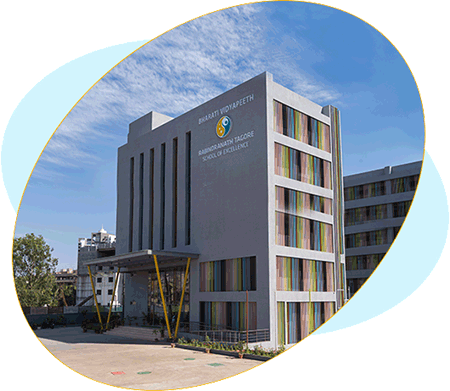As we look to prepare students for an increasingly complex world, schools are faced with the challenge of nurturing both the intellectual and emotional development of their students. Traditionally, schools focused primarily on academic achievement and cognitive skills, often measured through IQ (Intelligence Quotient). However, in today’s interconnected and dynamic environment, Emotional Quotient (EQ) has emerged as equally important. Forward-thinking schools, like Bharati Vidyapeeth Rabindranath Tagore School of Excellence (BVRTSE), recognize the importance of balancing these aspects to ensure students are not only prepared for academic competition but are also compassionate and ethical person.

Understanding the Role of IQ and EQ in Student Development
- IQ and Its Role in Problem-Solving and Analytical Skills
- IQ is often associated with intellectual abilities such as logical reasoning, problem-solving, and analytical thinking. These skills are essential for academic success, and students with strong IQ are typically well-prepared to tackle complex subjects like mathematics, science, and technology.
- In today’s rapidly evolving world, these abilities enable students to adapt to new information, think critically, and excel in challenging areas of study. However, while IQ can lay the foundation for academic and professional success, it alone is not enough to prepare students for real-life challenges.
- EQ: A Foundation for Communication, Empathy, and Leadership
- EQ, or emotional intelligence, involves the ability to recognize, understand, and manage one’s emotions and empathize with others. High EQ is linked to effective communication, stress management, teamwork, and leadership—skills increasingly in demand in both personal and professional spheres.
- Students with high EQ are better equipped to handle interpersonal relationships, manage conflicts, and lead with empathy. EQ helps them navigate stress and adversity, maintain positive relationships, and demonstrate resilience. These qualities are invaluable, especially in a future that will demand adaptability and collaboration across diverse environments.
- The Balanced Approach at BVRTSE: Building Competence and Character
- Bharati Vidyapeeth Rabindranath Tagore School of Excellence (BVRTSE) adopts a well-rounded educational philosophy that emphasizes both academic rigor and personal growth. The school recognizes that success requires not only intellectual knowledge but also emotional awareness, adaptability, and a strong ethical foundation.
- BVRTSE’s curriculum is designed around the principles of the International General Certificate of Secondary Education (IGCSE), which promotes a holistic approach to learning. Students are encouraged to excel in academics while also participating in activities that foster personal development. Through this balance, BVRTSE aims to mold students who are not only capable of excelling in a competitive world but are also conscientious and responsible individuals.
How BVRTSE Prepares Students for a Competitive World
- Academic Excellence and Critical Thinking
- At BVRTSE, academic excellence is achieved through a curriculum that emphasizes deep understanding and critical thinking over rote memorization. The IGCSE framework allows students to explore subjects in-depth, which helps develop strong analytical skills.
- Students are encouraged to participate in projects and assignments that challenge their intellect and build their problem-solving capabilities. This approach ensures that they are prepared for competitive exams and the intellectual challenges of higher education and beyond.
- Encouraging Emotional Intelligence and Social Skills
- Recognizing the importance of EQ, BVRTSE incorporates emotional intelligence training into its curriculum. Through group projects, collaborative activities, and guided discussions, students learn how to communicate effectively, handle disagreements, and work as part of a team.
- Teachers at BVRTSE serve as mentors who not only guide academic progress but also encourage empathy, kindness, and compassion among students. These qualities help students build meaningful relationships and navigate social interactions, preparing them to be empathetic leaders in the future.
- Promoting Character Building and Social Responsibility
- BVRTSE goes beyond traditional academic subjects by fostering a sense of responsibility and ethical values. Students are encouraged to participate in community service and social initiatives, which instils a sense of purpose and social responsibility.
- This focus on character building helps students become aware of the world around them and the importance of contributing positively to society. By making students aware of global and community challenges, BVRTSE nurtures their sense of empathy and responsibility, ensuring they grow into socially conscious individuals.
- Preparing for a Future of Change and Uncertainty
- The rapid changes in today’s world mean that the students of today will face challenges that we can’t yet predict. To prepare for this uncertainty, BVRTSE emphasizes the importance of lifelong learning, adaptability, and resilience.
- Students are encouraged to approach learning as a continuous process, developing a mindset that embraces change and seeks out new knowledge. This preparation for uncertainty helps them navigate future challenges with confidence and flexibility, equipped to face both personal and professional changes with resilience.
Conclusion: Educating Competent and Compassionate Individuals
Preparing students for the future requires more than just academic skills; it involves nurturing well-rounded individuals who are intellectually competent and emotionally intelligent. Schools like Bharati Vidyapeeth Rabindranath Tagore School of Excellence (BVRTSE) exemplify this balanced approach. Through a curriculum that emphasizes both IQ and EQ, BVRTSE is shaping students who are prepared to excel in their careers, navigate life’s challenges, and make meaningful contributions to society.
In a world where both competition and compassion are essential, BVRTSE’s commitment to educating the whole person—mind and heart—is laying the foundation for a better future.